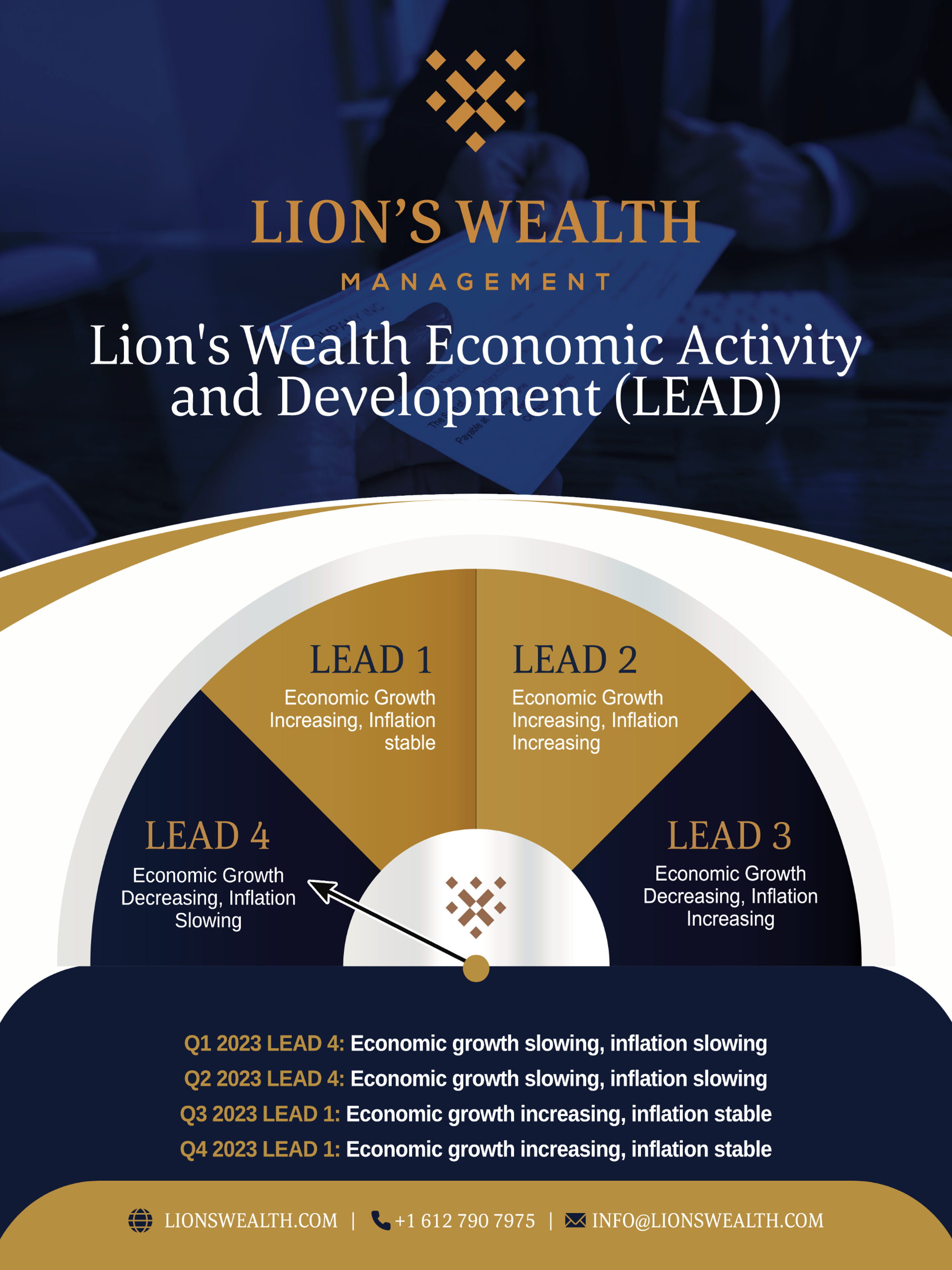In this blog post, we’re going know about essential topics like the economy, nowcast models, the Lion’s Wealth Economic Activity and Development (LEAD) Index, liquidity, the relationship between the stock market and liquidity, the Federal Reserve’s decision to raise interest rates, and the impact of inflation and other economic factors.

-
Economy:
The economy is the engine that drives our financial world. It’s all about how goods and services are produced, distributed, and consumed. We’re talking about everything from the local businesses in your neighborhood to global trade. Keeping an eye on economic indicators like GDP growth, employment rates, and inflation helps you understand the overall health of the economy. Why is this important? Well, it gives you a heads up on market trends and helps you make smarter decisions about your money.
-
Nowcast Model:
Nowcast models are like the crystal ball of economics. They use real-time data to give you up-to-the-minute estimates of economic performance. These models are pretty cool because they can help you anticipate shifts in the economy, giving you a leg up when it comes to making financial decisions. Whether you’re an economist or just a curious investor, nowcast models provide valuable insights into what’s happening in the economy right now.
-
Lion’s Wealth Economic Activity and Development (LEAD) Index:

Q2 2023 LEAD 4: Economic growth slowing, inflation slowing
We are in the second quarter of 2023, the LEAD Index maintains its stage 4 rating. This suggests that the trend of economic growth deceleration continues, accompanied by a similar slowdown in inflation. It indicates a sustained period of moderate economic activity and a relatively stable pricing environment.
-
Liquidity:
Let’s talk liquidity. It’s all about how easy it is to convert an asset into cash without causing big price swings. Think of it as the flow of money in the financial markets. Liquidity is important because it affects asset prices, trading conditions, and overall market stability. When markets are liquid, it’s smooth sailing. But when liquidity dries up, things can get a bit choppy. Understanding liquidity trends helps you assess market depth, anticipate potential hiccups, and adjust your investment strategies accordingly.
-
Stock Market vs. Liquidity:
Now, here’s an interesting relationship: the stock market and liquidity. When liquidity is high, the stock market tends to be more efficient and less prone to wild swings. On the flip side, low liquidity can lead to more volatility and less efficiency in the market. So, keeping an eye on liquidity levels helps you make smarter decisions about asset allocation, risk management, and even when to buy or sell stocks. It’s like having a cheat code for the stock market!
-
Federal Reserve Raising Interest Rates:
The Federal Reserve’s decision to raise interest rates is a complex process with far-reaching implications. By examining its impact on borrowing costs, inflation, financial markets, and the global economy, we gain a better understanding of the potential consequences of this policy move. As the Federal Reserve seeks to strike a balance between promoting economic growth and maintaining price stability, monitoring its decisions and their ripple effects becomes vital for businesses, investors, and individuals alike. Let us stay informed and prepared to navigate the evolving economic landscape as the Federal Reserve continues to shape monetary policy.
-
Inflation and Other Economic Factors:
Inflation, the general increase in prices over time, has become a topic of concern in the economy today. Various factors, such as increased government spending, supply chain disruptions, and labor shortages, have contributed to rising prices in certain sectors. Central banks are tasked with managing inflation through monetary policy measures, such as adjusting interest rates and implementing quantitative easing. Balancing inflation control with economic growth is a delicate task that requires careful consideration.
Conclusion:
We covered a lot of ground about the economy, nowcast models, and key economic indicators. By understanding how the economy works, leveraging nowcast models for real-time insights, paying attention to the Lion’s Wealth LEAD Index, recognizing the importance of liquidity, understanding the stock market’s relationship with liquidity, keeping tabs on the Federal Reserve’s interest rate decisions, and considering the impact of inflation and other economic factors, you’ll be well-equipped to navigate the ever-changing economic landscape.
Remember, economics doesn’t have to be daunting. By staying curious, seeking guidance when needed, and keeping yourself informed, you can make smarter financial decisions and set yourself up for long-term success.
Always consult with a financial professional before making any investment decisions.
[/fusion_text][fusion_separator style_type=”single solid” hide_on_mobile=”small-visibility,medium-visibility,large-visibility” sticky_display=”normal,sticky” class=”” id=”” flex_grow=”0″ top_margin=”10″ bottom_margin=”20″ width=”” alignment=”center” border_size=”” sep_color=”” icon=”” icon_size=”” icon_color=”” icon_circle=”” icon_circle_color=”” /][fusion_text columns=”” column_min_width=”” column_spacing=”” rule_style=”default” rule_size=”” rule_color=”” content_alignment_medium=”” content_alignment_small=”” content_alignment=”” hide_on_mobile=”small-visibility,medium-visibility,large-visibility” sticky_display=”normal,sticky” class=”” id=”” font_size=”” fusion_font_family_text_font=”” fusion_font_variant_text_font=”” line_height=”” letter_spacing=”” text_color=”” animation_type=”” animation_direction=”left” animation_speed=”0.3″ animation_offset=””]
The commentary presented herein contains the opinions of Lions Wealth Management, Inc., a State of Minnesota Registered Investment Advisor. This information should not be relied upon for tax purposes and is based upon sources believed to be reliable. No guarantee is made to the completeness or accuracy of this information. Lions Wealth Management, Inc. shall not be responsible for any trading decisions, damages, or other losses resulting from, or related to, the information, data, analyses or opinions contained herein or their use, which do not constitute investment advice, are provided as of the date written, are provided solely for informational purposes, and therefore are not an offer to buy or sell a security. Investments in securities are subject to investment risk, including possible loss of principal. Prices of securities may fluctuate from time to time and may even become valueless. This information has not been tailored to suit any individual.
[/fusion_text][/fusion_builder_column][/fusion_builder_row][/fusion_builder_container][fusion_global id=”2400″]








